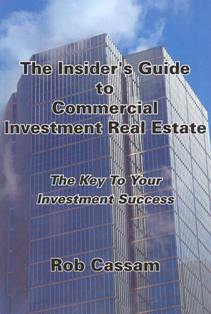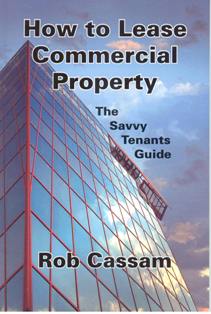In this issue I focus on a variety
of important commercial real estate topics for both tenants and owners. I hope some of these may
help you know or in the future. This new format includes money making tips
for all types of commercial real estate including tips for end users of
commercial real estate.
|
|
Warding Off The "Ghost Tenant" In Centers
|
"Ghost tenants" are one of
the nightmares of shopping
center owners. What are
ghost tenants? They are
tenants who do not operate
their businesses on the
premises continuously or who
vacate the leased premises,
but paying the minimum
rentals. As the manager or
landlord of a shopping
center, most of your income
depends upon income produced
by overages under the
percentage rental provisions
of your store leases. Not
only will ghost tenants
directly affect you by not
paying their specific
overages, they will also
hurt you indirectly since
vacant stores will cut down
on your center's drawing
power, which in turn means
reduced sales and overages
for other tenants.
Following are some of the
steps that we will take to
protect our clients against
deserting tenants.
Continuous Occupancy
The landlord and manager
should insist on an express
covenant by the tenant to
continue to occupy the
leased premises throughout
the lease term. This
covenant should also provide
that the tenant will operate
his or her business on the
leased premises during that
time and keep the store open
daily for the regular
conduct of business during
the hours specified. To give
teeth to this provision, we
will have a clause calling
for injunctive relief
requiring the tenant to
occupy and operate his or
her business continuously on
the premises. Also, of the
tenant fails to comply, we
shall have the right to
reoccupy and relet the
premises. Thus, the lease
should include a so-called
"recapture provision"
under which you can both
terminate the lease and
preserve the right to
collect reasonable damages
from the defaulting tenant
while making reasonable
efforts to relet the
premises to a suitable
tenant. The provision should
expressly describe the acts
of the tenant that will
amount to vacating the
premises.
Suggested Provisions
The shopping center lease
might provide as follows:
1. If the tenant fails
to occupy and use the
premises for the conduct of
his or her business for a
specified uninterrupted
period of time, the landlord
or manager can immediately
terminate the lease.
2. If the tenant fails to
maintain a specified sales
volume, the landlord can
immediately terminate the
lease. 3. The minimum
rental should not be deemed
adequate or substantial for
purposes of determining
damages for tenant's failure
to comply with these
provisions. 4. The
inducement for entering into
the lease on the part of the
landlord was the expectation
of earning percentage
rentals and the minimum
rental is only a partial
advance payment of the
annual percentage rental (as
shown by the credit granted
to the tenant for the
minimum rental payments).
5. A provision for
liquidated damages should
also be included under which
the measure of damages is
the combined sum of the
established minimum rental
plus, say, the average
percentage rental paid for
the preceding three years or
the highest percentage
rental previously paid under
the lease.
|
The Insurance That A Commercial Tenant Must Carry
|
When Insurance coverage must be addressed by both
landlords and
tenants. For the run-of-the-mill daily problems, a landlord
must have the maximum coverage for the building and the tenant's leases. The
tenant must cover the business with coverage that will protect it. What if
you have a small disaster that is easily repaired, but you lose a tenant
because he was not covered for the damage inside the business?
Consequential Loss Coverage
A fire or other peril may
cause a financial loss other than that resulting from direct destruction of
the property. Such losses are called "consequential losses" and include
those resulting from the loss of use of the property destroyed, such as
interruption of business, and property loss from indirect connection with
the hazard rather than from direct destruction. The types of insurance
against consequential losses include:
1) Business interruption
insurance.
2) Delayed profits insurance, which covers the loss of profits that result from
a delay in the completion of the construction.
3) Leasehold insurance,
which covers a tenant's financial loss if the lease is
canceled as a result of fire or other insured peril.
Business
Interruption Insurance A business interruption policy normally embraces both
loss of income and "added expense" protection. The latter may be the more
important because it reimburses the tenant for the special costs associated
with obtaining substitute equipment and (if temporary space is needed
elsewhere), the cost of renting such quarters. To the extent that the
tenant's profits are adversely affected, notwithstanding the ability to
continue operations, protection is furnished by the loss-of-income feature
of this coverage. Business interruption policies can be more effective with
appropriate endorsements that enlarge the covered causes of loss and extend
the period of indemnity.
Two examples are the following:
1) Nonbuilding damage. The standard policy only covers losses
attributable to a casualty to the building itself. If damage extended to
telephone and data service lines located outside the building, resulting
losses to the tenant would be covered only under an appropriate endorsement
to the policy.
2) Extended restoration. The standard policy limits the
indemnity
period to the time needed to restore the building to
its precasualty
condition. This may be less than the time needed for
actual restoration, for example, when local law requires the reconstructed
building to meet updated code standards. The policy coverage can be extended
for this purpose by endorsement.
Lease Termination Insurance
When casualty damage is so extensive that the landlord can cancel the lease,
the tenant may incur loss because it is unable to lease elsewhere on
comparable terms. Leasehold interest insurance protects against such loss.
The loss is equal to the discounted present value of the difference between
(1) the rental specified in the lease and (2) the higher market rent for
comparable space, projected for the balance of the lease term, including all
renewal option periods.
|
|
How You Can Use Options For Big Profits
|
When most owners and investors think about options
on real estate,it is usually one-dimensional. The option is just a way
for a buyer to tie up a piece of property. Sometimes it is for a
speculation, with the buyer gambling that the property will increase in
value to a figure higher than the option price. Other times, the buyer
just wishes to hold the property with a smaller investment of cash until
the time is right to purchase and use it. Sometimes buyers and sellers
use options for long term planning and tax considerations. Here are
some examples:
Ensure Future Sale At a Fixed Price
Suppose the owner of real estate wishes to hold it for an additional two
years when he expects to be in a much lower tax bracket. However, he would
like to ensure a sale at that time at a price to be fixed now. The owner
could enter into an immediate contract of sale with a delayed closing.
However, this likely would be considered an immediate sale for tax purposes
because the burdens and benefits of ownership would be deemed transferred
immediately to the buyer. Instead, the parties could enter into the
following arrangement. The owner gives the buyer an option to purchase the
property in two years at the current market price, for which the buyer pays
a $5,000 fee to the owner. The buyer simultaneously gives the owner a put
option on the property with the same exercise price. In order
that the two options not be mirror images of each other, the owner pays
the buyer a fee of $2,500 and his option expires several months earlier
than the buyer's option. As a practical matter, it is virtually certain
that the sale actually will take place, since either the owner or the
buyer will exercise his option depending on whether market value rises or
falls. Nevertheless, the (somewhat remote) possibility that neither party
will wish to exercise his option should protect the parties from an IRS
challenge that an immediate sale occurred. (For some authority to support
this view, see Penn-Dixie Steel Corp. v. Commissioner, 69 T.C. 837
(1978).)
Providing Nonrecourse Financing
Suppose a farmer wants to
continue to operate his farm for another five years, until he reaches age
65. A developer wants to buy the land for a residential subdivision. The
developer offers to pay $100,000 for an option giving him the right to
buy the land after five years for $1.1 million (his projection of the
market value at that time). The farmer, who needs cash, counters with an
offer to give the developer an option for a fee of $500,000, under which
the developer would have the right to buy the property five years hence
for 85% of the then market value, with the $500,000 to be a credit
against the purchase price. If the developer accepts, the farmer, in
effect, has received a $500,000 loan repayable in five years, assuming
the option then is exercised by the developer. In consideration of the
"loan," the farmer will pay "interest" equal to 15% of the property's
fair market value at the end of five years. If the market value then is $
1.1 million, total interest would be $165,000 (15% of $1.1 million) or
about 6.6% annually. The developer might be willing to accept this offer
because of the following benefits to him:
>He will get a 15% discount
if the option is exercised;
>The entire $500,000 will be credited
against the purchase price; and
>He is protected on the downside, since
the exercise price will drop if market value in five years is less than
projected. Of course, if the option is not exercised by the developer,
the farmer gets $500,000 outright. Thus, the developer is not likely to
agree unless he is very sure he wants the property. (If the property
rises in value, the developer must pay more; but given the $500,000 cash
credit plus 15% discount, it is highly unlikely that he would end up
paying more than the $1.1 million value originally placed on the
property.)
Note: The risk in the transaction is that the IRS might
challenge it by arguing that exercise of the option by the developer is a
foregone conclusion, since the option price is a fraction (85%) of fair
market value at the time of exercise and also because the $500,000 fee is
credited against the purchase price. The developer's position is that his
business is highly speculative and that a recession or high interest
rates could prevent exercise of the option. |
|
|
|
In This Issue
|
|
Warding Off The 'Ghost Tenant' In Centers |
|
The Insurance That A Commercial Tenant Must Carry |
|
How You Can Use Options For Big Profits |
|
Featured Listings |
|

|
2012 IRR View Point Report Available
2012 IRR Report is now available for download.
Check out the various markets and see where they fall within the real estate
cycle for INSTITUTIONAL grade properties.
click here
|
|
Contact Information |
Rob Cassam, MBA, CCIM
Carolina Realty Advisors
1001 East Blvd. Ste. B
Charlotte NC 28203
Tel: (800) 587-4066 Ext. 100
Fax: (704) 442-8841
robcass@ix.netcom.com
Website
|
|
What I do... |
|
I provide real estate brokerage services for small and medium sized businesses,
investors, and individuals who are fed up with losing money, paying too much
and/or, spending too much time not getting the right piece of property for their
particular situation. I act as the quarterback in the real estate transaction for my clients who coach
me in managing all of their different needs.
My clients love not needing to worry about making bad decisions or bad
investments and love winning negotiations.
Owners Of Commercial Space
How
are your properties helping you in your life?
Have
your investments turned out as planned?
What
types of problems have you had growing your portfolio?
How
has the economy impacted your rents and vacancy?
Are
you satisfied with your income and asset portfolio?
Is it meeting your needs?
How
much of a problem is dead equity in your property?
How
long are you prepared to go on doing nothing about situations in your business
that are not quite right?
End Users Of Commercial Space
What types of growing pains is your company facing with your location?
Are rising occupancy costs a challenge your company is facing?
Is having too much space or not enough space a challenge your company is
facing?
How much of a problem is dead equity in your property for you?
How long are you prepared to go on doing nothing about situations in
your business that are not quite right?
Give me a call, I may be able to help.


|

How To Lease Commercial Property |
|